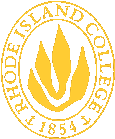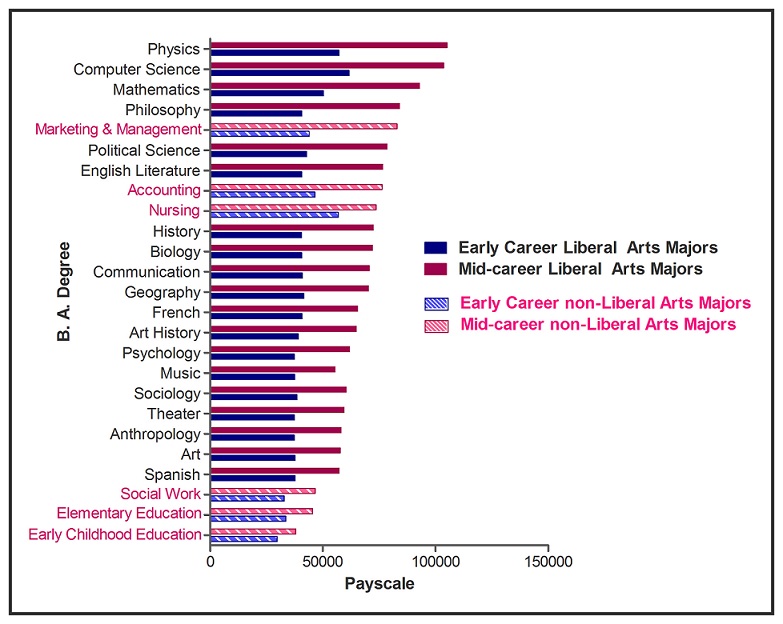|
|
Apply Now
Explore
RIC
Give Now
Ask RIC
|
 |
Rhode Island College |
|
|
About
RIC
Academics
Admissions
Alumni & Donors
Athletics & Recreation
Campus Life
Library
Performing & Fine
Arts |
|
|
MAJOR IN THE LIBERAL ARTS & SCIENCES
|
|
In 2010, Steve Jobs famously mused that
for technology to be truly brilliant, it must be coupled with artistry.
“It’s in Apple’s DNA that technology alone is not enough,” he said.
“It’s technology married with liberal arts, married with the humanities,
that yields the results that make our hearts sing.” Other tech CEOs
across the country agree that liberal arts training--with its emphasis
on creativity and critical thinking--is vital to the success of their
business.
http://www.fastcompany.com/3034947/the-future-of-work/why-top-tech-ceos-want-employees-with-liberal-arts-degrees |
|
|
|
|
What are the
Liberal Arts and Sciences?
Liberal Arts majors
include the social sciences, sciences and humanities. Most majors are
around 40 credits, making it possible for students to have a second
major or a minor field.
A Liberal Arts and
Sciences education provides students with both broad knowledge in a
variety of areas of study, and in-depth knowledge in a specific field of
interest. The majors develop students’ skills in problem-solving,
critical and analytical thinking, research, quantitative reasoning, and
oral and written communication.
Liberal Arts students are
taught "... to become lifelong learners who are their own best
teachers. We teach them to take intellectual risks and to think
laterally—to understand how the humanities, the arts and the sciences
inform, enrich and affect one another. By connecting diverse ideas and
themes across academic disciplines, liberal-arts students learn to
better reason and analyze, and to express their creativity and their
ideas. They are capable of thinking and acting globally and locally."
Marvin Krislov,
president of
Oberlin College
http://hechingerreport.org/content/the-enduring-relevance-of-a-liberal-arts-education_14033/
Top
|
|
|
Liberal Arts degrees provide the skills employers want
Employers value the
kinds of skills that Liberal Arts degrees provide. These are
transferable skills and cross-cutting capacities that can be applied in
a variety of employment contexts. They are critical to have in a dynamic
economic world in which people typically change employment several
times.
A 2013 survey of
employers by the
Association of American Colleges & Universities and
Hart Research Associates found the following:
-
Nearly all those
surveyed (93%) say that “a demonstrated capacity to think
critically, communicate clearly, and solve complex problems is more
important than [a candidate’s] undergraduate major."
-
“80 percent of
employers agree that, regardless of their major, all college
students should acquire broad knowledge in the liberal arts and
sciences.”
-
"The majority of
employers agree that having both field-specific knowledge and skills
and a broad range of skills and knowledge is most important for
recent college graduates to achieve long-term career success. Few
think that having field-specific knowledge and skills alone is what
is most needed for individuals’ career success.”
-
The survey also found
that “74% of employers surveyed would recommend this kind of education
to a young person they know as the best way to prepare for success in
today’s global economy.”
The skill-sets and content knowledge that were
developed for the Arts and Sciences
General Education
are emphasized within all majors. The abilities we have identified as important
include:
|
1.
Written Communication
2.
Critical and Creative Thinking
3.
Research Fluency
4.
Oral Communication
5.
Collaborative Work
6.
Arts |
7.
Civic Knowledge
8.
Ethical Reasoning
9.
Global Understanding
10.
Quantitative Literacy
11.
Scientific Literacy
|
Top
|
|
|
Transferable
skills and cross-cutting capacities
So, what does that really mean? How do
the abilities that are developed in all Liberal Arts majors at Rhode
Island College translate into skills employers are looking for?
-
Employers want people who are
comfortable with subjectivity and ambiguity. Often
there are multiple solutions or approaches to solving a problem.
Many jobs require nuanced thinking: that which is not simply
black and white and that which digs beneath the surface.
-
Problem-solving and the ability to approach a problem from
multiple and informed perspectives is desirable; understanding that most issues
are multifaceted and multi-dimensional, requiring a broad knowledge
base in additional to specialized training. Employers value
workers who have mastered a content base but who also have a breadth
of knowledge, and who can put that
knowledge to work in solving problems.
-
Employees must have excellent verbal
communication abilities. They need to be able to clearly
articulate their ideas and to be able to communicate effectively
with co-workers and they people they serve. A good vocabulary, both
expressive and logical thought, and rapport are important.
-
Active listening, or the ability to hear
and fully understand another's ideas and opinions is necessary in
effective communication. An employee must be able to give
thoughtful consideration to others, especially when there are
differing opinions.
-
Employees must have excellent
written communication. They need to be able to spell and use
correct grammar. Employers want people who can write for
different levels of understanding and for different purposes.
-
Employees need to have excellent research skills.
They need to be willing to dig to get accurate and meaningful data.
Data collection methods including surveys, interviewing, use of
databases and
observation are valued. Archival research and online
web-sourcing are useful tools.
-
Employers want people who have excellent analytical
skills, people who can organize information and process complex data sets.
Both qualitative and quantitative analysis methods are important.
-
Ethical thinking and integrity are
central to the well-being of any organization, ensuring the respect
and reputation of its
employees. Businesses often include
integrity management to foster ethical behavior and personal
integrity in the workplace. These include responsibility to
oneself as well as to the group, reliability and an internal moral
compass.
-
Diversity can mean many things: age, sex,
ethnicity, physical or cognitive ability, education, socio-economic
level, etc. A Liberal Arts education prepares students to
negotiate an increasingly diverse environment and, regardless of
what profession one pursues, intercultural understanding and the
ability to thrive in a diverse environment is necessary.
-
Liberal Arts majors are required to complete
some group projects. Collaboration is a highly desirable
skills sought by employers. It includes the ability to work with
others, to respect another’s opinion, to listen to and
acknowledge the feelings, perception, opinions, and ideas of others, to succeed to completing tasks
to contribute to the larger goal, and to support group
decisions even when members are not in total agreement.
-
Employers seek workers who love what they do and
will keep at it until they get the job done. They want
employees who are willing to commit to long term goals,
not immediate gratification.
-
Employers seek creativity and innovation,
the ability to approach a problem in a novel way.
-
Because the world is ever and rapidly changing,
employers are interested in hiring workers with a commitment to continued learning.
Liberal Arts education fosters a commitment to life-long scholarly
engagement that will prepare majors to meet the unknown demands of
the future; the ability to anticipate, respond to, and manage change.
-
Applied knowledge is highly desirable; it is hands-on, real world
experience. Many
Majors and Programs offer internships and Field Courses and all
majors offer Independent Studies, Directed Studies and Directed readings
courses in which students can hone these skills.
-
Employers and, let's face it, employees seek
personal satisfaction in the workplace: it is fulfilling to be
able to do what you
love. If you'll be spending 40 hours a week doing something,
you'll get the most satisfaction in doing something meaningful to
you, which can only translate into being a better employee.
Top
|
|
|
Liberal Arts degrees lead
to well-paying jobs
There is a common misperception that Liberal
Arts degrees lead to low-paying jobs. On the contrary, recent data from
Payscale.com shows that students graduating with an undergraduate
Liberal Arts degree earn as much as, if not more than, those who
obtained a degree in pre-professional majors.
 |
|
|
For the most part, STEM (science,
technology, engineering and math) majors dominate the list of
top-earning college majors, but that doesn't mean you can't make a good
living if you aren't a computer whiz or future electrical engineer.
Humanities majors can make a solid living, especially when we compare
mid-career salaries. Philosophy majors have the highest mid-career
salaries amongst the humanities majors - $84,000 after 10 years of
experience. The critical thinking skills associated with humanities
majors like global and international studies, English language and
literature and history can lead to a lucrative career, but it may take
more time for those graduates to settle into a career than somebody with
a technical degree.
http://www.payscale.com/college-salary-report/majors-that-pay-you-back/bachelors
Top
|
|
|
Liberal Arts
degrees provide high educational value
A national study of
student learning in college found that “students
majoring in liberal arts fields do better on the
Collegiate Learning Assessment (CLA) and show
greater improvement [in critical reasoning skills] than students
majoring in non-liberal-arts fields.” Scholars have also found that
higher CLA scores are associated with higher employment rates. |
|
|
 |
|
|
Top
Choosing a Liberal Arts major
If you’re not sure
which major to pursue, we have designed ‘exploratory majors’ to help you
make this decision.
Exploring the Arts –
leads to majors in Art, Music, Theatre, Dance, or Film Studies.
Exploring the Social
and Behavioral Sciences – leads to majors in Africana Studies,
Anthropology, Communication, Gender Studies, Geography, Justice Studies,
Political Science, Psychology, Public Administration, or Sociology.
Exploring the
Sciences/Math – leads to majors in Biology, Computer Sciences,
Chemistry, Mathematics, Physics, or Health Sciences.
Exploring the
Humanities – leads to majors in English, History, Modern Languages, or
Philosophy.
Top
|
|
Enhance Your Liberal Arts
Major
Double Major
Most majors are around 40 credit hours and the General Education
Program is 40 credit hours, and students must complete an additional
40 credit hours to graduate. There are often courses in the general
education can be used to fulfill major requirements. With
careful planning and working closely with a faculty advisor,
students completing a double major can finish in the normative time.
Undertaking a double major, especially when both majors are
complimentary, expands your skill set.
"Social science,
humanities or art majors can increase their future earning potential
with complementary STEM skills that make them more valuable to
employers. For example, Industrial Designers are paid well (median
income of $84,100) because they combine their artistic training with
engineering skills. Similarly, Senior Technical Writers, who are usually
English majors but may have technical skills like HTML, earn a median
salary of $85,100."
http://www.payscale.com/about/press-releases/lists/press-releases/payscale-releases-second-installment-of-yearly-college-salary-report-focusing-on-majors-careers
Top
|
|
Minor
It is
possible to pair a Major with a Minor. All of the
Majors and
Programs listed near the top of this page include
a Minor. Below are additional Minor options. Most minors require 18-22
credit hours of course work. Having a minor can allow you to build
additional skills and knowledge in ways the complement your major.
Top
|
|
Honors
All Liberal Arts and Science Majors offer
Departmental Honors.
Departmental Honors
offers students the opportunity to undertake an independent research,
critical, or creative project on a topic of the student’s choice which
is overseen by a professor of the student’s choice. Students
usually design their own projects that dovetail with faculty interests.
Although some students work quite independently on their projects, all
Departmental Honors students receive close, one-on-one mentorship from
faculty who are leaders in their areas of expertise.
Normally, the project
is carried out in the senior year, although it may commence earlier, and carries
six to eight hours of independent study credit over two semesters.
Top
|
|
Internships
Most Liberal Arts
majors provide internships and other applied learning opportunities to
help students translate classroom learning to real world
applications. These
experiences have a strong appeal for employers and students are
encouraged to pursue them. Examples of Internship programs offered
at Rhode Island College include (but are not limited to):
The Lippitt House Museum
Literacy
Volunteers of East Bay
Elizabeth
Buffum Chace House
Dorcas
International Institute of Rhode Island
Rhode Island
Coalition against Domestic Violence
RI State Internship Program
The
faculty advisors can assist with finding an internship. The
Career Development Center
also
has community contacts
and hosts Internship
Showcase Events.
Top
|
|
Field Courses
Political
Science:
London Course
Anthropology:
Field courses in Cultural, Archaeological,
Biological and Linguistics
Top
|
|
Study Abroad
Rhode Island College students, no matter what their majors, may study
abroad for course credit at institutions in other countries. They may
study for a semester, an academic year, the summer, or during the early
spring term.
While studying abroad,
students do not pay RIC tuition and may apply their financial aid to
program costs, including tuition, at the host institution and toward
travel expenses.
The choice of program and
specific location depend upon the student’s interests. The Study Abroad
Office provides information about the study abroad process, assists
students with their applications, and facilitates transfer of credits.
Rhode Island College is
affiliated with seven study abroad program providers that offer
discounted tuition for RIC students: Academic Programs International,
the American Institute for Foreign Study, the Center for International
Studies, The Education Abroad Network, CAPA International Education,
GlobaLinks Learning Abroad, and SIT Study Abroad. All of these providers
can be found on the Web. However, students are not limited to these
affiliates and may study with many other programs and universities
around the world. Also, individual faculty members may lead RIC courses
abroad from time to time.
For more information
contact the
Study
Abroad Office
Top
|
|
Research, Creativity
and Performance
All Majors and Programs in
the Liberal Arts offer opportunities for students to conduct their
own research projects or creativity and performance in the
fine arts. Students select a faculty mentor with whom they
will work and enroll in an Independent Study or Directed Study
course.
Top
|
|
|
The Liberal
Arts and Sciences develop the whole person
Technical knowledge is
important, but it’s not enough. The Liberal Arts ask deeper questions
about the nature of the individual, society, and our physical world.
Students learn not only how to do things but also why we do them. This
kind of thinking is essential for leadership in business, government,
education and other fields.
This approach can also
lead to a more fulfilling life. A
2014 Gallup poll found higher job
satisfaction in people who majored in the social sciences, sciences, and
arts and humanities than those who majored in business.
Top
|
|
|
Liberal Arts
majors are successful in their careers and in their lives
Liberal
Arts RIC Alumni
-
Viola Davis, actress in movies including The Help,
Doubt, and the television show, How to get Away With
Murder; Theater Arts major
-
Desiree Ciambrone, Professor of Sociology,
Rhode Island College; Sociology Major
-
Quenby Hughes, Associate Professor History, Rhode Island College; History Major
-
Alan Fung, Mayor of Cranston, RI; Political
Science Major
-
James Langevin, U.S. Representative for
Rhode Island's 2nd congressional district; Political Science
Major
-
David Noble, Deputy Chief of Staff, NASA;
Communications Major
-
Michael A Montecalvo, News Anchor/Reporter,
WPRI; Communications Major
-
Peter Boyer, composer; Music Major
-
Lisa Perry,
Autumn Olive (fiber arts and
clothing up-cycling); Anthropology Major
Top
|
|
Well-known Liberal Arts Majors
-
Mitt Romney, Bain Capital CEO and
English major; Brigham Young University
-
Clarence Thomas, Supreme Court
Justice, English major; Holy Cross College
-
Hank Paulson, Former Treasury
Secretary and English major; Dartmouth College
-
Harold Varmus, Nobel Laureate in
medicine and English major; Amherst College
-
Ted Turner, CNN founder; Classics
major; Brown University
-
Peter Thiel, CEO of PayPal, 20th
century Philosophy major; Stanford University
-
Carl Icahn, activist investor, Philosophy major; Princeton University
-
Carly Fiorina, Ex-HP CEO and
medieval History and Philosophy major; Stanford University
-
Ken Chenault, CEO at American
Express, History major; Bowdoin College
-
Robin Williams, Comedian and Actor;
Sociology Major
-
Michelle Obama, First Lady and Lawyer;
Sociology Major
-
Reverend Martin Luther King; Sociology major
-
Richard Anderson, CEO at Delta; Political Science major at the University of Houston
-
Michael Crichton, author;
Anthropology Major; Harvard
-
Glenn Close, actress; Anthropology major
-
Francis Perkins, social reformer and
former Secretary of Labor, Chemistry and Physics major; Mount Holyoke College
Top
|
|
|
For further
information
Brochure on Majoring in the
Liberal Arts
Contact the chairperson of any
of the above Majors
or Programs
Call the office of
the
Dean of the Faculty of Arts and Sciences at (401) 456-8107
Top
|
|
|
Further Reading
Why Top Tech CEOs Want Employees With
Liberal Arts Degrees
http://www.fastcompany.com/3034947/the-future-of-work/why-top-tech-ceos-want-employees-with-liberal-arts-degrees
Liberal Arts Grads Win Long-Term
https://www.insidehighered.com/news/2014/01/22/see-how-liberal-arts-grads-really-fare-report-examines-long-term-data
New Report Documents That Liberal Arts
Disciplines Prepare Graduates for Long-Term Professional Success
http://www.aacu.org/press/press-releases/new-report-documents-liberal-arts-disciplines-prepare-graduates-long-term
Bachelor's Degrees by Salary Potential
http://www.payscale.com/college-salary-report/majors-that-pay-you-back/bachelors#explanatory
Liberal Arts Degrees and Their Value in the
Employment Market
https://www.aacu.org/nchems-report
It Takes More than a Major: Employer
Priorities for College Learning and Student Success: Overview and Key
Findings
https://www.aacu.org/leap/presidentstrust/compact/2013SurveySummary
AACU Hart Associates report on employer
survey:
http://www.aacu.org/leap/documents/2013_EmployerSurvey.pdf
Wall Street Journal table of median
salaries:
http://online.wsj.com/public/resources/documents/info-Degrees_that_Pay_you_Back-sort.html
Methodology overview that led to WSJ table:
http://www.payscale.com/2008-best-colleges/salary-report.asp
Top |
|
 |
Rhode
Island
College |
600 Mount Pleasant Avenue
Providence, RI 02908
(401) 456-8000
theweb@ric.edu
Site Map ·
Disclaimer |
|
|
|
|
 |
 |
 |
Faculty/Staff Directory

Department Directory

Campus Map

|



